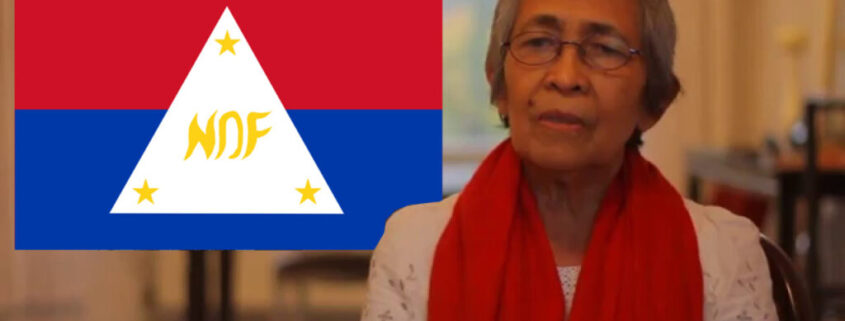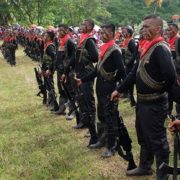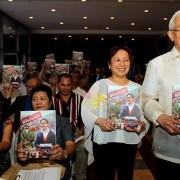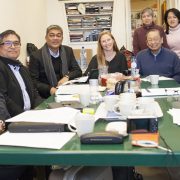NDFP to Carpio: Hague Joint Declaration, not GRP Charter, to remain as talks framework
The National Democratic Front of the Philippines (NDFP) Negotiating Panel expressed disagreement with former Supreme Court Senior Associate Justice Antonio Carpio’s advise that its future peace agreements with the government must be in accordance with the Philippine Constitution.
In a statement, NDFP panel interim chairperson Julie de Lima said they will not agree to allow the Philippine Constitution to govern future peace negotiations and reiterated that their group’s Hague Joint Declaration with the Government of the Republic of the Philippines (GRP) remains the framework of the process.
Instead of the GRP charter, The Hague Joint Declaration signed on September 1,1992 stipulates that the holding of the peace negotiations must be in accordance with mutually acceptable principles, de Lima said.
These principles include national sovereignty, democracy and social justice, as well as the absence of preconditions that shall negate the inherent character and purpose of the negotiations, she added.
In his opening statement at the 1Sambayan peace web forum Wednesday, the retired magistrate advised that the peace agreements must be in accordance with the Constitution, lest it suffers the fate of the Memorandum of Agreement on Ancestral Domain (MOA-AD) between the GRP and the Moro Islamic Liberation Front signed in 2008.
“Any peace agreement can be forged as long as it is within the Constitution. That is the only criterion, that the Constitution be followed. And that criterion allows for very broad parameters to achieve peace,” Carpio said.
He then recalled the Supreme Court’s issuance of a temporary restraining order on the eve of the signing of the MOA-AD in Kuala Lumpur due to so-called violations of several provisions of the government Constitution.
‘Welcome, but no’
De Lima said they welcome Carpio’s positive views on the need for the peace negotiations but said the NDFP will not agree to the GRP Constitution as the framework of future talks.
She said both the NDFP and the GRP signed and have repeatedly reaffirmed the Hague Joint Declaration, especially its decisive provision statement stating that, “No precondition shall be made to negate the inherent character and purpose of the peace negotiations.”
“This means that no party, neither the (GRP) nor the (NDFP) shall make a precondition insisting that its constitution be the sole determinant of the GRP-NDFP peace negotiations,” de Lima said.
She explained that if the GRP Constitution is allowed as the new framework, it means the imposition of surrender and capitulation of the NDFP and its forces.
“Then there would be no real negotiations. It would mean unilaterally imposing surrender particularly on the NDFP,” de Lima said.
“Preconditioning the peace negotiations with the submission or surrender of one side to the Constitution of the other is the prevention of peace negotiations,” she added.
The Hague Joint Declaration on the other hand is an agreement of parity and reciprocity as it opens the way to peace negotiations on Social and Economic Reforms (SER), Political and Constitutional Reforms (PCR) and End of Hostilities and Disposition of Forces (EHDF), De Lima explained.
NDFP’s own Constitution
De Lima said that that NDFP refuses to recognize the GRP charter as the sole determinant of the peace negotiations as it has its own Constitution.
She said that one of the reasons why the Declaration was crafted and signed was because both parties are expected not to impose their respective legal and constitutional process on the other.
Instead, the third substantive agenda in The Hague Joint Declaration, the PCR, anticipates potential mechanisms to ensure the compatibility of the parties’ respective legal and judicial processes and frameworks with prospective agreements on SER and EHDF.
The GRP and the NDFP earlier signed the Comprehensive Agreement on Respect for Human Rights and International Humanitarian Law in 1998, the first substantive agenda under the Declaration.
“In the concrete, either or both Parties should be open to tweak their respective organic documents to make them consistent with whatever is achieved in the negotiating table to give life to the SER and PCR as well as the EHDF provisions so they can be implemented both jointly as well as separately by the Parties,” de Lima said.
As a matter of fact, even under the ongoing CASER drafts, there are multiple proposed provisions on practical cooperation, including projected GRP congressional appropriations for genuine land reform and national industrialization, she added.
“At all events, the Parties should and are expected to anticipate, address and hurdle any constitutional and legal concerns or challenges that arise or may arise when they negotiate and enter into agreements,” de Lima said. # (Raymund B. Villanueva)







